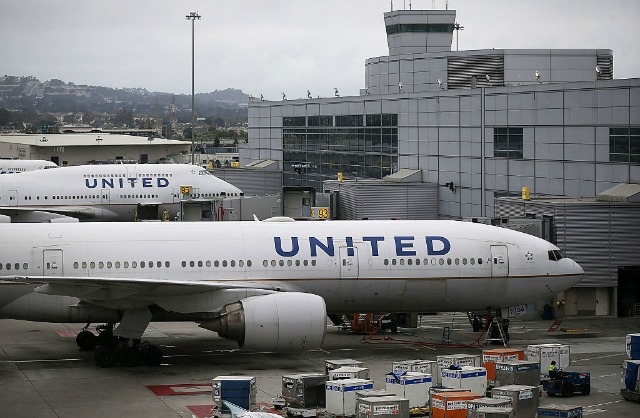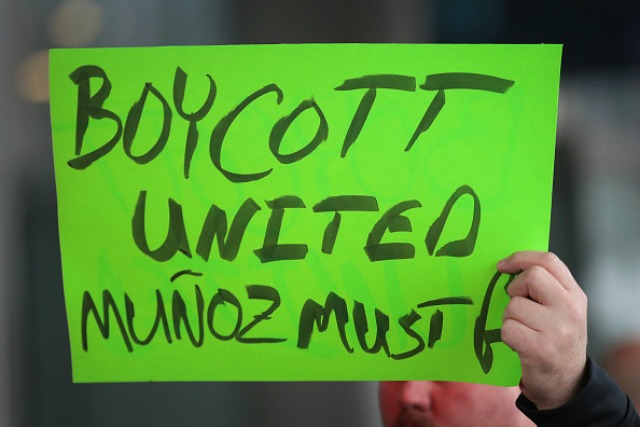With Grotesque Profits & Worse Ethics, Airlines Are A Bloody Outrage
By Stephen Gossett in News on Apr 12, 2017 9:52PM

Getty Images
Remember when the airline industry wanted to charge you to use the bathroom on flights? One of the most basic necessary bodily functions, one that sometimes you really can't delay, which could get really ugly and painful if you're sealed in a jet thousands of miles in the sky with no other options. No? It wasn't long ago at all, just back in 2015, in fact. Pay-to-pee sounds like the sort of sci-fi micro-aggression that would be the hallmark of a dystopian young-adult novel, but it almost happened.
I mention this, of course, to illustrate that the incident on United Express Flight 3411—now known to the world as the time Dr. David Dao was violently removed from his seat on the plane, dragged down the aisle, and had his face bloodied from smacking into an armrest—is symptomatic of a larger, ongoing disease in the airline industry, one that places a perverse emphasis on profit motive, sometimes at the expense of basic human dignity.
First, there's the overbooking bet that airlines constantly wager—a problem the industry apparently felt comfortable solving by throwing money at passengers, even if, as we saw with United, still parsimoniously, ever mindful of the bottom line. (You gotta be mindful of your return when you're only netting $2.3 billion in profits, as United did just last year.) True, 3411 wasn't overbooked, as United originally stated. But all 70 seats were sold and occupied, and when crew members needed those seats, the decision was made to enforce the full extent of the small print—Dao's sense of humanity be damned.
"Why is an armed agent of the state using violence to enforce a contract freely entered into by two private parties?" asked Fusion's Alex Pareene. "Because that is more or less how you define 'classical liberalism.'" When you take the capitalist impulse to its illogical end point, people are literally left on the floor.
There's a rather grotesque class element at play here, too. This stuff doesn't happen if you're, say, a frequent flier or a high "status" passenger. Chances are these passengers aren't getting approached about removal in the first place.

Photo: Scott Olson
"For passengers looking to take advantage of the budget seats offered, this unspoken ranking and largely unknown class system is important to know. Though companies take great pains to say otherwise, if you paid less, you are not as valued a customer."
It's also impossible to not to see a racial component, too. Marie Myung-Ok Lee argues in Paste, convincingly, that the violence to which the airline officer resorted probably would not have been inflicted on a white man. In media, through United, or via law enforcement, Dao was cast as "perverted, unreasonable, loud, bumbling." The brutality was only compounded, of course, when outlets dug up victim-blaming tabloid details of his past.
Given all that we've witnessed in recent American history, it's no surprise that a minority, non-"status" person would be physically harmed for "violating" the capitalist contract. (Yes, one could argue that Dao being a doctor affords him "status," but not as far as airplane politics are concerned.) But the airline industry seems to always be pushing the line, seeing how far it can stress the norms of market (and moral) acceptability.
Remember, this is the industry that squeezed down its market share from 18 to 10 large/mid-sized airlines within just 10 years, leaving the winners with even greater spoils. Eighty percent of U.S. flights are handled by just four carriers.
"Travelers have reason to be wary of such mergers. Many of today's hated airline practices, including adding loads of fees, eliminating hubs and routes, shrinking seat space, and packing planes fuller than ever, can be traced back to the previous round of mergers that saw carriers such as Continental, US Airways, and AirTran disappear."
Yes, it's true that the initial mergers that kickstarted this trend happened while the industry was in free fall. But that hasn't been the case for some time, and the carriers are now bending over backwards to maintain lack of competition and profits that are now at a windfall.
"According to the IATA North American airlines have raked in over $20 billion in profits for each of the past two years. They expect that number to dip, slightly, to around $19.5 billion next year. "2017 is expected to be the eighth year in a row of aggregate airline profitability, illustrating the resilience to shocks that have been built into the industry structure," the IATA writes in its annual analysis."
There are media corners that have been quick to chastise unfettered-capitalist critiques of the United fiasco ('sup Breitbart). But that just plays into the hands of airliners' avariciousness, airliners who rack up earnings but would rather not allow you a pot to piss in.